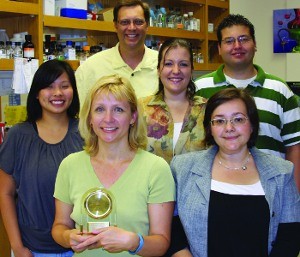Phase 2b clinical trial of Arbaclofen in Autism Seaside Therapeutics reports the study did not show improvement on the primary endpoint of social withdrawal, but it did demonstrate improvement on the Clinical Global Impression of Severity scale.
Read moreResearch Updates
Clinical Trials FAQ ← Frequently Asked Questions
Question: How Do Families Decide Which Trial is Best for Them? Answer: Each of the trials has different requirements for joining, so many – if not most – people will only be eligible for one trial after screening. The best way to approach this is to call the clinic contact closest to your area and discuss this with him/her. Age, weight, current medications, behavior, and IQ are all factors.
Read moreFRAXA Progress and Future Plans
It’s official: Fragile X is now the hottest research topic in all of neuroscience! Just last month, massive publicity attended the publication of Fragile X clinical trial results and major papers by FRAXA’s outstanding translational researchers. Even as news of the first round of Fragile X clinical trials is emerging, Phase III trials (which can lead to actual marketing of medications) are under way and slated to finish around the end of the year. This is exciting, and it is just the tip of the iceberg.
Read moreWhat Works, and What Doesn’t
At the start, it’s always hard to know what methods will work best for something as complex as the development of disease-modifying treatments for Fragile X. But, we’ve always tried to let the science lead us down the right path. At this point, the results are unequivocal, and they have shaped how we are looking for the Next Great Thing in Fragile X treatments.
Read moreCompound that Inhibits mGluR5 Corrects Signs of Fragile X in Adult Mice
A study finds that a new compound reverses many of the major symptoms associated with Fragile X syndrome (FXS). The paper is published in the April 12 issue of the journal Neuron, describing the exciting observation that the FXS correction can occur in adult mice, after the symptoms of the condition have already been established. Previous research has suggested that inhibition of mGlu5, a subtype of receptor for the excitatory neurotransmitter glutamate, may ameliorate many of the major symptoms of the disease. This study, a collaboration between a group at Roche in Switzerland, led by Dr. Lothar Lindemann, and Dr. Mark Bear’s MIT lab, used an mGlu5 inhibitor called CTEP to examine whether inhibition of mGlu5 could reverse FXS symptoms.
Read moreFRAXA Announces 2012 Fragile X Research Awards
In 2012, Fragile X Research was awarded $1,132,923 in new program grants, postdoctoral fellowships, and renewals. We are funding over $846,000 in new projects; renewals totalling $285,678 and will increase as additional projects reach their one year mark. View report here.
Read moreFragile X Research Grants and Fellowships Funded 2011
In 2011, FRAXA awarded $1,054,286 in Fragile X Research. Each year FRAXA holds a competition to find – and fund – the most promising new projects aimed at discovering targeted, effective treatments – and ultimately a cure – for Fragile X and related autism spectrum disorders. Each team has a page on this website with details. Our competitive grant-making process ensures that the best and most innovative research gets supported, that new scientists join the Fragile X field, and most important – that we get closer to a cure. FRAXA aims to advance the kind of translational research that is most likely to lead to improved treatment.
Read moreFRAXA 2010 Research Awards Funded
Program Grants and new Postdoctoral Fellowships total over $1.5 million this year. We are very pleased to announce FRAXA 2010 awards. Projects can be viewed at the Research Reports section of this website. These scientists have demonstrated outstanding potential of their FRAXA projects in detailed applications. We aim to help them work toward new treatments for Fragile X. Their projects are at the cutting edge of biomedical technology, and we believe that their work will make a real difference to everyone affected by Fragile X.
Read moreResults of First Fenobam Trial in Adults with Fragile X Published
We are pleased to announce the publication of positive results of a Phase IIa clinical trial of fenobam in Fragile X. Fenobam belongs to a class of compounds known as mGluR5 antagonists. Neuropharm, a specialty pharmaceutical company based in the U.K., received Orphan Drug Designation in the US in 2006 for fenobam in the treatment of Fragile X, after acquiring rights to relevant data on the compound from FRAXA. This trial was conducted in the US by Drs. Randi Hagerman of the UC Davis MIND Institute and Elizabeth Berry-Kravis of the RUSH University Medical Center, and initial results were first announced last summer.
Read more3 Researchers Honored at FRAXA Investigators Meeting
Over 150 scientists from around the globe gathered in Durham, New Hampshire, for FRAXA Research Foundation’s Investigators Meeting on September 21-24, 2008. They came from Australia, Canada, India, Turkey, the U.S., and eight European countries. Their common goal: “to share, collaborate and publish,” in the words of FRAXA’s Medical Director, Michael Tranfaglia, MD, to find effective treatments and a cure for Fragile X, the foremost inherited cause of mental retardation and autism. Most of the attendees were university-based professors, postdoctoral fellows, and graduate students who have FRAXA research grants. Also participating in the meeting were scientists from the National Institutes of Health (NIMH, NICHD, and NINDS), Neuropharm Group PLC, Hoffman LaRoche Inc., GlaxoSmithKline, Indevus, and Seaside Therapeutics, as well as 20 parents of Fragile X children.
Read moreResearchers Propose Minocycline to Treat Fragile X

A University of California Riverside team of scientists has found that an available drug called minocycline, used widely to treat acne and skin infections, might also be used to treat Fragile X. The study’s findings have already led to the approval of a FRAXA-funded clinical trial in Toronto, Canada, that will test minocycline in patients with Fragile X.
Read more